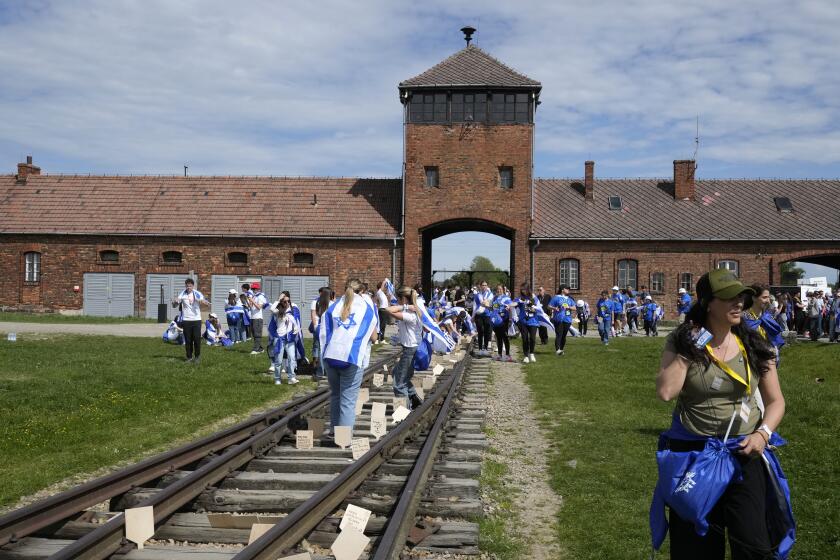Mexican Sisters Can’t Attend U.S. Funeral : Border Snag Unravels Family
Stunned by the killing in Pacoima of Rebecca Espinoza--shot in the stomach during her ninth month of pregnancy--her family left home in the Mexican state of Sonora to attend her funeral.
But four of the six Alvarez daughters were stopped at the border.
This morning, while Rebecca Espinoza is buried in Forest Lawn Memorial Park with her stillborn son in her arms, her youngest sisters are in mourning in the small town of Imuris, Sonora.
At a time when the close-knit Alvarez family said they needed most to be together, they are separated because of what they say is insensitive treatment by the U. S. Immigration and Naturalization Service and State Department officials who refused to let all the immediate family enter the United States.
“Mis hijas, mis hijas . My daughters, my daughters,” wept Concepcion Alvarez, 51, Espinoza’s mother. “I need them all here with me now.
“I understand that there have to be laws at the border, but this was different. How could they be so insensitive?” she asked while gathered with U. S. relatives in a modest Arleta home.
Espinoza, 27, who had been due to deliver her baby next week, was shot once in the stomach Sunday night and died after emergency surgery at Holy Cross Hospital in Mission Hills. Doctors performed a Caesarean section, but the fetus was stillborn.
Her husband, Augustin Miranda, 23, was arrested in the shooting and charged Thursday with two counts of murder in the deaths of Espinoza and the unborn child. Miranda was being held without bail at the Foothill Division Jail. Police say a “domestic dispute” prompted the shooting.
David Alvarez, Espinoza’s father and a minister in the Free Methodist Church, said Friday that his daughter’s death, compounded by the absence of his children, makes it “hard to understand God’s will.”
Last week, in their Mexican home, Alvarez and his wife had talked about visiting their daughter in preparation for the birth of their grandchild. “Becky has given us all so much,” he said. While working in Los Angeles as a seamstress, she sent enough money home to enable the family to buy a small house.
“I can only hope now that some time soon my daughters will be able to come here to pay respects at the grave of their sister,” Alvarez said.
Espinoza’s parents and two of her sisters were allowed to enter the country because they have passports and U. S. tourist visas. But Espinoza’s other sisters--ages 10, 15, 18 and 19--did not have such documentation. And their requests for emergency visa waivers were denied by officials at the U. S. Consulate in Tijuana.
A consular official familiar with the case said the daughters were refused entry because “they could not show they intended to stay only temporarily in the United States.”
Under federal immigration law, applicants must prove that they plan to stay in the United States only temporarily. They must convince consular authorities that they have ties to their home country, such as employment and family responsibilities.
“The visa interviewer was not satisfied that they were only going to stay for a few days,” said the consular official, who asked that his name not be used.
The entry denial Wednesday capped three days of attempts by Alvarez family members in National City and Pacoima to gather documents they believed were necessary to obtain the emergency visa waiver.
The family had requested the waiver for their four other daughters from INS officers at the Otay Mesa border crossing in San Diego. Cliff Rogers, INS deputy district director in San Diego, said INS officers have the authority to waive visa requirements for “medical emergencies and humanitarian reasons” only when the consulate in their region is closed.
Because the funeral was planned later in the week, INS officials decided the family had ample time to seek the waiver through proper channels.
The family in Pacoima gathered several documents for submission to the consulate: a letter from Holy Cross Hospital and Forest Lawn stating that Espinoza had died and was to be buried, a copy of the police report of the killing and a letter from Free Methodist Church superiors in Southern California attesting that the church would assume responsibility for the daughters.
“What else could we show to prove my daughters were coming to this country to attend a funeral?” Alvarez asked. “I did the best I could. Then I had to send my daughters home alone.”
More to Read
Start your day right
Sign up for Essential California for news, features and recommendations from the L.A. Times and beyond in your inbox six days a week.
You may occasionally receive promotional content from the Los Angeles Times.






